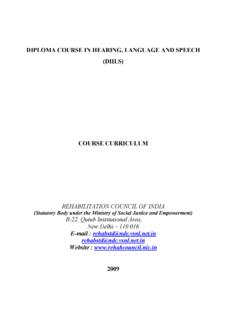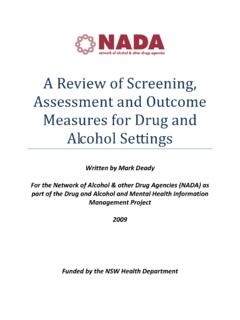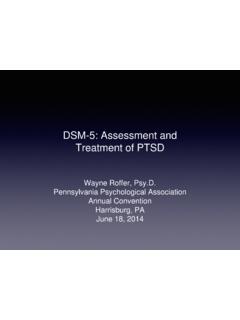Transcription of Professional Diploma in Clinical Psychology Final-15-3-11.…
1 SYLLABUS. Professional Diploma . IN. Clinical Psychology . Norms, Regulations & Course Content REHABILITATION COUNCIL OF INDIA. (Statutory Body under the Ministry of Social Justice and Empowerment). B-22, Qutab Institutional Area , New Delhi 110 016. e-mail ; website : 2011. Professional Diploma in Clinical Psychology INTRODUCTION. Although in the last five years number of centers offering Clinical Psychology training and the number of students undergoing the Professional training in Clinical Psychology have increased by many folds the available manpower is still no match to the number required to meet the growing demands in mental health area.
2 In order to meet this gap, Professional training of one-year duration in Clinical Psychology laying emphasis on critical domains has been developed. The candidates on successful completion of the Professional Diploma in Clinical Psychology can register with RCI as Clinical Psychologist (Associate) under CRR and function in service settings as expert/specialist in non-academic service settings. Distinction The Clinical Psychologists (Associate) are distinguished from the qualified Clinical Psychologist. The later are full-fledged professionals with higher level of competency and responsibility in service, academic and research areas; whereas Clinical Psychologists (Associate) by the nature and duration of their training are consider not fully adept to function as an academician.
3 They are, however, considered competent enough to involve in a broad range of Professional service activities. The Clinical psychologist (Associate) will be used as an underfill class for existing Clinical psychologist positions under state and central government sectors. However, the role in such appointments are limited only for providing Clinical services to clients with mental illness and does not involve independent responsibilities in academic activities such as teaching/training/guiding/supervising students of Clinical Psychology at the academic departments.
4 In these activities Diploma qualified may be assigned roles of Clinical Assistant and/or Teaching Assistant or Junior Consultant as deemed fit in teaching/training centers. AIM & OBJECTIVES OF THE COURSE. Aim The aim of this course is to train students with acceptable level of competency to offer the basic mental health services such as identifying and diagnosing mental health problems in different populations, and intervening with appropriate counseling and psychotherapy/behavior therapy techniques while applying relevant code of 2. conduct and ethical principles in all his/her activities.
5 This cadre of professionals has been created, as emphasized earlier, to fulfill the acute shortage of trained personnel in mental health field. The Diploma qualified professionals are expected to contribute as an expert and specialist in the multi-disciplinary team setting, and undertake the services activities as defined below: 1) interview and diagnose mental health problems 2) Carryout psychological assessment (Intelligence, Developmental abilities, Academic skills, Adaptive and Social Maturity, Personality, Diagnostic and Clinical Ratings). 3) Carryout Psychoeducation, Counseling, Psychotherapy and Behavior Therapy 4) In all of the above (1 3) apply code of conduct and Professional ethics.
6 Objectives The course is organized as one-year fulltime face-to-face training program with theoretical inputs and hands-on Clinical experience, to provide services with minimum level of competence in core areas of Clinical Psychology . On successful completion of the course, the candidates are eligible to be considered for specialist posts (but not for faculty appointments in the field of Clinical Psychology teaching and training) in a wide variety of health care settings such as short-term and long- term mental health care facilities, mental health institutes, private/public run general or mental hospitals, nursing homes, rehabilitation units, schools and other community care centers as Associate Clinical Psychologist.
7 On completion of the course, the trainees are expected to perform the following: interview and diagnose mental health issues Carry out Clinical work up, plan psychosocial interventions and set goals Administer, analyze and interpret commonly used psychometric tests (intelligence, personality, diagnostic and Clinical ratings of symptoms, assessment of disability, dysfunctions, family burden and stress) and communicate findings to other team members Certify IQ and disability status for government pension or concessions 3. Impart psychoeducation to clients with mental illnesses and family members and discuss regarding management/prevention issues (tackle myths and misconceptions, if any Undertake therapeutic/rehabilitation interventions at individual and family levels both in institution and community set-ups Participate in outreach and community mental health services (DMHP).)
8 Undertake school counseling and relevant assessments Manage/contribute in suicide prevention centers, crisis center, grief counseling centers, tele-counseling, drop-in-centers Participate in wellness promotion, stress/conflict management and other supportive measure programs for employers, caregivers, teachers etc. Undertake the role of teaching assistant, where necessary REQUIREMENTS TO START THE COURSE. All centers/universities recognized by the RCI for conducting 2-yr Clinical Psychology program are eligible to offer the course. In addition, voluntary service organizations (NGOs), hospitals with psychiatry and Clinical Psychology facilities (inpatient/outpatient) are also eligible to conduct the training provided they have the required infrastructure in terms of Clinical materials and other facilities.
9 Postgraduate Department of Psychology at universities having attachment with any of the Clinical centers (a valid MOU is required) to place the trainees for hands-on experience under supervision of RCI registered Clinical psychologist can also offer the program. In all cases, the center offering the training should demonstrate the following minimum infrastructure: An average monthly turnover of at least 125 patients (new and old together) with mental health care needs. At least two registered faculty members ( Clinical Psychology qualified from RCI recognized centers) at the center, out of which one shall be permanent faculty member functioning on fulltime basis at or above the level of Assistant Professor (2 years post-qualification experience + 2 research publications, desirable), the other faculty 4.
10 Member need not be fulltime member, but accessible to the students on daily basis. Of the total turnover at least 50% of the cases shall be undergoing psychological treatment(s) of some form viz. psychotherapy, behavior therapy, counseling, family/marital/sex counseling/therapy etc. Intervention which doesn't involve face-to-face interaction (eg. tele- counseling, e-counseling etc.) is not considered for computing monthly turnover. Standard psychological tests, equipments/apparatus, questionnaires, scales, inventories, Clinical rating scales related to all primary domains shall be available as specified below.
















